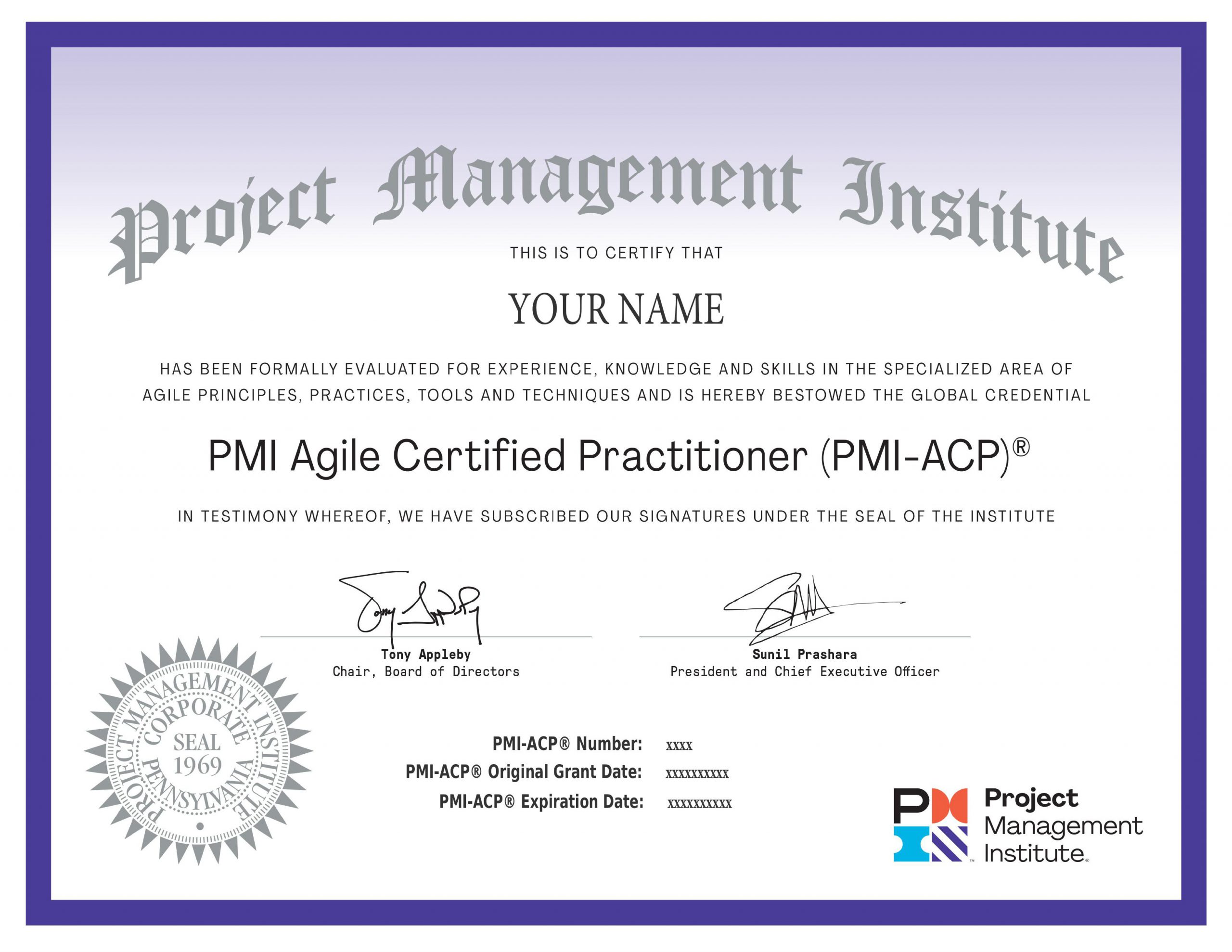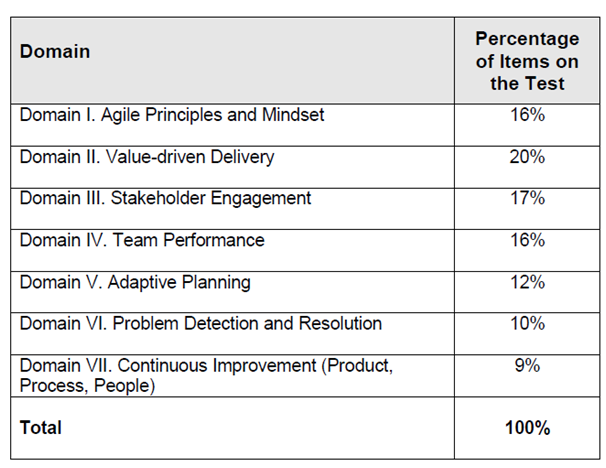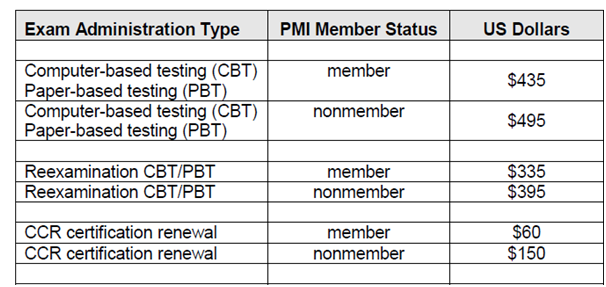Recognizes your agile principles and skill knowledge with agile techniques.
Show your peers that your agile knowledge runs deep.
Increase your versatility to do any project.
Developers
Scrum Master
Product Owner
Team leader
Technical leader or technical manager
Business Analysts
Tester and system analyst
Quality manager and production support manager
Design engineer and quality analyst
Demonstrate your Agile Team Experience
Ensures that you understand agile values and principles.
Illustrate an Agile Mindset
Build a working understanding of Agile approaches, such as Scrum, Kanban, XP, and TDD.
Understand the Agile concepts such as user stories, retrospective meetings, burn down charts, and timeboxing
Learn Advanced Agile Methodologies such as test-driven development and continuous integration
Enroll in the PMI-ACP® course
Access to our e-learning course, including mock questions
Get the 21 contact hours certificate from us
Start filling out exam applications. Our experts will help you.
Submit application
Submit a fee, schedule and pass the exam.
Present that everyone has a shared understanding of agile values and principles
Illustrate eliciting and prioritizing functional and non-functional requirements to minimize the probability of failure.
Facilitate defining ground rules with all team members to encourage team commitment to shared outcomes.
Define work from the end-user point of view and minimize non-value-added work.
Facilitate working with business stakeholders to know their interests, needs, and expectations.
Evaluate feedback on the product by incremental delivery and frequent demonstrations to improve the product's value.
Present team processes by conducting frequent retrospectives.
Present progressive elaboration of top-level plans as the team moves forward.
Ensure plans are visible and transparent to increase commitment and reduce uncertainty.
Apply high team morale by discovering team and personal motivators and demotivates.
40+ hours of classroom-style videos using interactive whiteboard session
120 days of E-Learning access
500+ PMI-ACP® exam questions as per PMI-ACP® content outline
PMI-ACP® exam lesson notes, tips, & tricks, and glossary
Access to a community of 5000 PMI® professionals
An optional one-on-one session with the expert trainer
PMI-ACP® 21 contact hours certificate
Continuous end-to-end support to pass the PMI-ACP® exam in the first attempt.
Easy returns 7 days 100% money-back guarantee
“Explore various approaches to agility - Scrum, Kanban, Lean, Extreme Programming (XP) and Test-Driven Development (TDD).”


Premium Authorized Training Partner of PMI (PMI ATP)

Best PMP-ACP® online Training Material to pass the exam in the shortest possible time

Trained instructors to support you end to end whenever you need

Mentored professionals across 30+ countries

1000+ Informational videos on our YouTube channel

55,000+ subscribers are getting the benefit

Query Handling Facility over Email and Phone

Continuous Support Through dedicated Forum

500+ enrollments every month

Dedicated Customer Support for PMI® Membership
PMI-ACP® certification training is 21 hours of the online program focused on clearing agile misconceptions of project managers. The training makes you eligible to take the PMI-ACP® exam conducted by PMI. It’s a globally recognized certificate that gives you an overview of Agile as a project manager and offers insights on different agile methodologies such as Scrum, Kanban, TDD, BDD, etc.
PMI-ACP® certificate is a reputed agile certificate by PMI, an international body known for contributing to the Project management domain. PMI conducts the PMI-ACP® exam, which tests your understanding of Agile and its different frameworks. A PMI-ACP® exam-certified professional is globally recognized for its ability to lead agile transformation.
It’s a contextual question. For someone with considerable experience in agile, the exam may sound easy, while if you have just completed your 1500 hours of agile experience, you may find some of the agile concepts confusing. This is where our online PMI-ACP® certification training comes in. Our experienced trainer clears all your misconception and flawed understanding of agile and introduces you to agile and various frameworks in the simplest manner possible.
The cost of the PMI-ACP (Agile Certified Practitioner) exam varies by country. For specific details on the exam cost in India and the United States, please refer to the subsequent FAQs tailored for these regions. For information on the exam costs in other countries, we encourage you to reach out directly to iZenBridge by writing to sales@izenbridge.com. This approach ensures you receive the most accurate and current pricing information tailored to your location.
If you’re preparing for the PMI-ACP certification in India, here’s what you need to know about the exam fees:
For PMI Members in India:
Total Membership Fee (Including GST): ₹11,611.20
Total Exam Fee (Including GST): ₹29,511.80
Grand Total (Exam and Membership Fees, Including GST): ₹41,123.00
For Non-Members in India:
Total Exam Fee (Including GST): ₹33,575.72
In the case of the PMI-ACP exam, the fee is lower for non-members compared to members when considering the total membership and exam fees.
For USA PMI-ACP exam aspirants, the costs of the PMI-ACP exam are as follows:
PMI Members:
Membership Fee: $149
Exam Fee: $435
Combined Total: $584
Non-Members:
Exam Fee: $495
In the case of the PMI-ACP exam, the fee is lower for non-members compared to members when considering the total membership and exam fees.
PMI-ACP® exam consists of 120 objective-type questions. In addition, a breakup question across different agile domains is defined by PMI.

Project Management Institute, PMI Agile Certified Practitioner (PMI-ACP)® Examination Content Outline Page 3.
PMI does not disclose the passing score for any of its certifications.
To gain a PMI-ACP® certificate, you need to take an online exam by PMI. In addition, you should fulfill the following eligibility criteria:
You would need to attend 21 hours of a person or online agile training with a PMI Registered education provider. iZenBridge PMI-ACP® certification online training helps you fulfill this requirement.
If you become a member of PMI before filling up your PMI-ACP® exam application, you can save $60 on your exam fee. Here is the detail of different exam types and respective fees.

Project Management Institute, PMI-ACP® Handbook – revised 9 May 2019 Page 11.
The membership cost is USD 129, and you should become a member before paying the exam fee to get a discount.
PMI-ACP® exam is not that difficult. If there is one thing common in all PMI-ACP® certification success stories published on the iZenBridge forum, people follow a plan.
You can visit our website and buy the extension of the online program. Your training program will be continued for the extension period, and all your previous assessments will be carried forward.
No, having any scrum experience before PMI-ACP® certification is not mandatory. For a person appearing in the PMI-ACP® certification test, PMI® expects prior experience of a minimum of 8 months working on an Agile team. PMI considers your involvement in practices which support agile values and principles. For more details, please refer following blog – https://www.izenbridge.com/blog/pmi-acp-eligibility-experience-criteria-demystified/
No, there is no specific book for preparing for PMI-ACP® certification. PMI has a recommended set of 12 books for preparing for PMI-ACP® certification. You need an understanding of which content is useful for the PMI-ACP® exam content outline. You need expert help to know what you need to prepare from these books. Our course serves that purpose.
If you are joining our online program on PMI-ACP® certification, this is sufficient for your preparation. We have made sure of a complete alignment with the PMI-ACP® exam content outline.
There is no specific time limit to define a time period for PMI-ACP® exam preparations. This depends completely on an individual’s efforts and the time slot. In general, 3-6 weeks’ duration is enough if you can invest 10-20 hours per week. If you are in a 4-5 years experience bracket, 100+ hours of dedicated study with our online training should be sufficient to help you clear the exam.
Yes, we provide a course completion certificate or 21 PDUs in PDF format after completing an online course and assessment test. iZenBridge has been approved by PMI to issue PDUs for this course
Once you have completed the 21 hours of study in our system, you can request the Contact hours certificate.
The purpose of the assessment test is not ‘Pass or Fail’ but to assess the preparation of our students and identify any area of improvement. The assessment test is required of PMI to mark the completion of the 21 contact hours course.


Seema Sonkiya having approx. 13 years of experience in Scrum, Extreme Programming, lean, and others that fall under the Agile umbrella. She also has good exposure in busine...
Head Office: 526, Vipul Trade Center, Sector 48, Sohna Road, Gurgaon.
Training: (+91) 9958287711 | sales@izenbridge.com
Write a Review